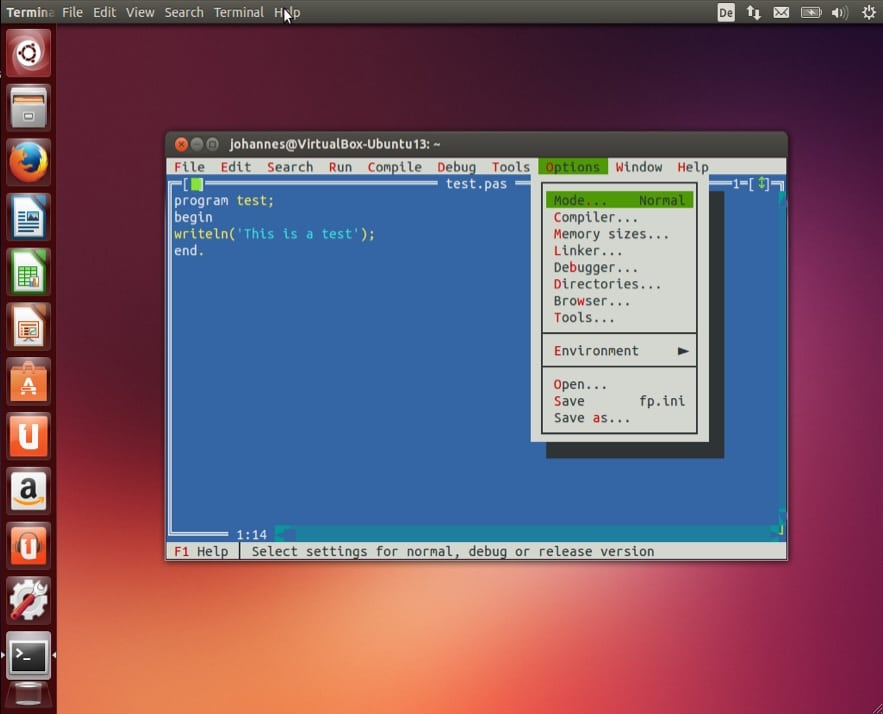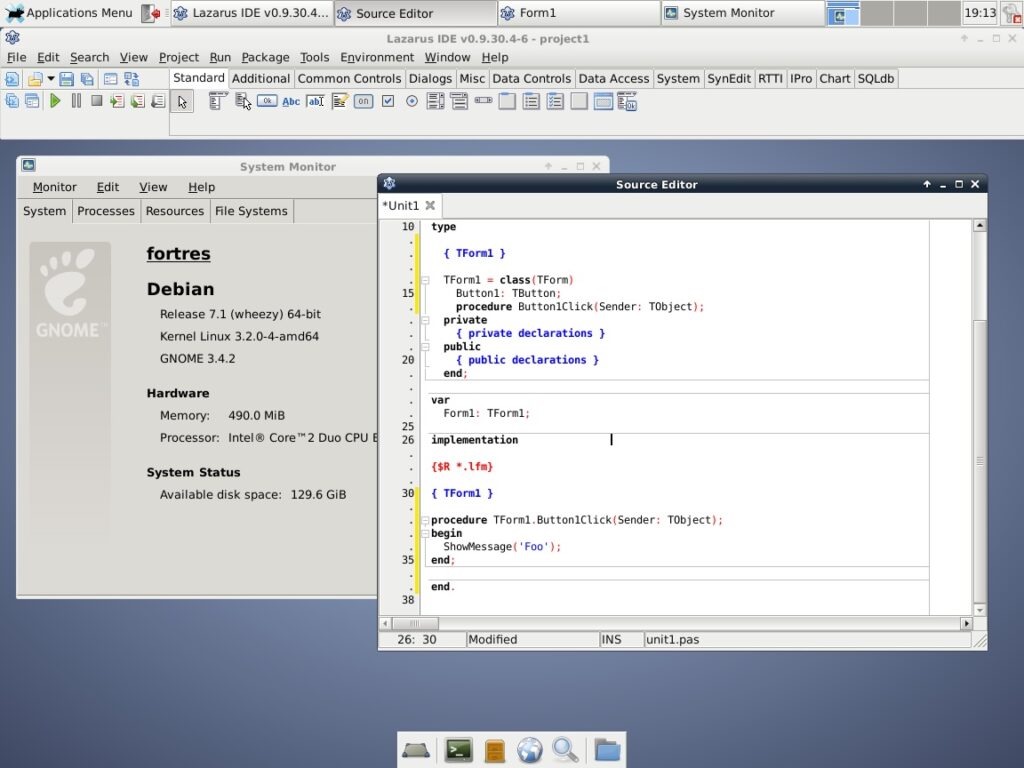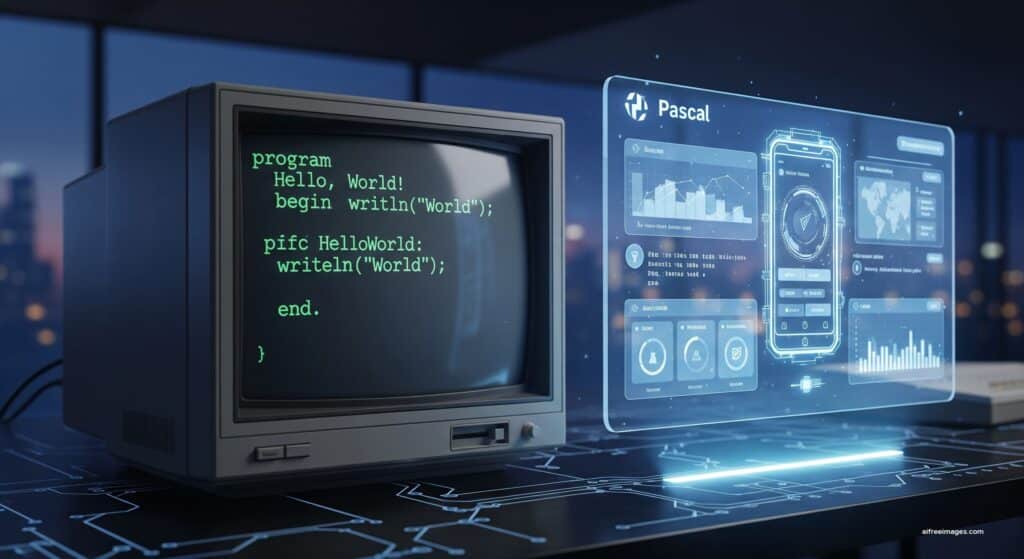Pascal is often dismissed as a language of the past — something that belongs in the history of computing alongside FORTRAN and COBOL. Yet in 2025, Pascal remains both relevant and valuable. Whether you are a beginner trying to learn solid programming practices, or an experienced developer looking for cross-platform tools, Pascal deserves your attention.
Pascal Is Still Alive — and in the Top 10
Contrary to the common myth that “nobody uses Pascal,” the TIOBE index places Pascal within the top 10 programming languages, ahead of modern favorites like Rust, Kotlin, and Swift.
This ranking isn’t accidental. Developers continue to use:
- Delphi (Object Pascal) for commercial Windows applications.
- Free Pascal + Lazarus IDE, the open-source, cross-platform alternative, gaining adoption in education, startups, and hobbyist programming.
Why Pascal Is Excellent for Beginners
Pascal was designed in the 1970s by Niklaus Wirth with a clear purpose: to teach structured programming. Its design enforces discipline in a way that Python or JavaScript often do not.
Key features for learners:
- Strict typing: every variable must be declared and has a defined type.
- Separation of procedures and functions: promotes clarity between code that returns values and code that doesn’t.
- Readable syntax: encourages writing code that is easy to maintain.
By forcing good habits, Pascal provides a foundation that makes learning C, Java, or C# much easier later.
Why Experienced Developers Use Pascal
Pascal is not just for classrooms. Modern Object Pascal includes:
- Object-oriented programming: classes, inheritance, polymorphism, exceptions.
- Low-level capabilities: pointers and memory management similar to C, when needed.
- Cross-platform portability: write once, compile anywhere with Lazarus/Free Pascal.
- Visual design tools: create desktop GUIs with drag-and-drop ease.
This makes Pascal ideal for building utilities, desktop software, and prototypes that can run on Windows, Linux, macOS, and even Raspberry Pi.
Lazarus + Free Pascal: The Modern Combo
- Lazarus IDE: a full-featured, open-source development environment similar to Delphi or Visual Studio.
- Free Pascal Compiler (FPC): a robust compiler available on all major platforms.
- Project portability: start coding on Windows, copy the project to Linux, and recompile with almost no changes.
📥 Download Lazarus and Free Pascal here: https://www.lazarus-ide.org/
Example: A Simple Pascal Program
Here’s a quick example showing Pascal’s clarity and structure.
program HelloPascal;
uses crt; { Library for console utilities }
var
name: string;
begin
clrscr;
writeln('Welcome to Pascal 2025!');
write('Please enter your name: ');
readln(name);
writeln('Hello, ', name, '! Pascal is still alive and kicking.');
readln; { Keeps console window open }
end.
Code language: JavaScript (javascript)- The program declares variables explicitly (
name: string). - It uses clear syntax (
writeln,readln) instead of cryptic symbols. - With Lazarus IDE, the same program can later be extended into a GUI form application without changing the underlying logic.

Advanced Example: Object Pascal with Classes
Modern Pascal supports OOP:
program OOPExample;
type
TCar = class
private
FBrand: string;
public
constructor Create(Brand: string);
procedure Drive;
end;
constructor TCar.Create(Brand: string);
begin
FBrand := Brand;
end;
procedure TCar.Drive;
begin
writeln('The ', FBrand, ' car is driving!');
end;
var
myCar: TCar;
begin
myCar := TCar.Create('Tesla');
myCar.Drive;
myCar.Free;
end.
This example shows:
- Encapsulation via private fields.
- Constructors and object lifecycle.
- Syntax comparable to modern object-oriented languages like Java or C#.

Why Pascal Still Matters in 2025
- Education: still used in universities to teach programming fundamentals.
- Cross-platform apps: Lazarus allows the same codebase to target multiple OS.
- Productivity: strong visual design tools accelerate GUI development.
- Community support: Free Pascal and Lazarus are maintained and widely adopted.
- Bridge between high- and low-level: lets you write safe, structured code but also access memory and hardware directly if needed.
Conclusion
Pascal is not just a nostalgic curiosity. In 2025, it remains a powerful, structured, and versatile language. For beginners, it’s one of the best ways to learn disciplined coding. For professionals, it’s a free, cross-platform solution for desktop and utility development.
The combination of Free Pascal + Lazarus IDE makes it practical, modern, and completely free to use.
Frequently Asked Questions (FAQ)
Is Pascal really still used today?
Yes. It ranks in the top 10 of the TIOBE index, ahead of Rust and Kotlin. It’s actively used in education and with Lazarus for cross-platform development.
Is Pascal good for learning programming in 2025?
Absolutely. Its strict structure forces good habits, which transfer easily to languages like C++ or Java.
What’s the difference between Delphi and Free Pascal?
Delphi is the commercial IDE/compiler, mainly for Windows. Free Pascal + Lazarus is open-source and works across Windows, Linux, macOS, and ARM devices like Raspberry Pi.
What types of projects can I build with Pascal?
From command-line tools to GUI desktop apps, scientific software, and educational projects. With Lazarus, you can build native applications for multiple platforms with a single codebase.

